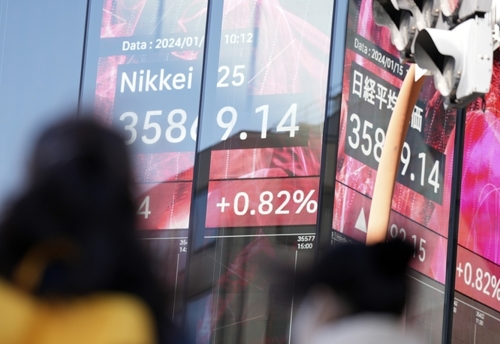
(Nikkei 225 index | AP)
Trial court’s simplistic interpretation of KOFIA Agreement, which failed to consider nature of individual products, is overturned
This case arose when KB Securities conducted a wholesale reverse trading on Nikkei 225 index options (Osaka Exchange) held by Winners Asset Management in February 2020 on the grounds of valuation losses due to a change in the price of the options, without issuing a margin call (a request that additional margin be deposited). KB Securities filed a claim against Winners Asset Management, etc. for receivables arising in this process, and Winners Asset Management, etc. filed a counterclaim against KB Securities for losses arising from the reverse trading.
The trial court held that since KB Securities’ reverse trading was conducted duly in accordance with Article 14, Paragraph 2 of Korea Financial Investment Association (“KOFIA”)’s Agreement on Opening of Omnibus Accounts for Trading on Overseas Derivative Market (“KOFIA Agreement”), it was therefore lawful, and ordered Winners Asset Management, etc. to pay the receivables while absolving KB Securities from damages.
This, however, was a ruling that failed to take into account a deficiency in the KOFIA Agreement. Nikkei 225 options are European options, meaning that temporary losses in valuation alone do not impose performance obligations on a customer. The Osaka Exchange and securities management firms in Japan reflect such losses only on the calculation of the margin and do not consider them grounds for reverse trading, a fact not taken into account in the KOFIA Agreement.
Article 14, Paragraph 2 of KOFIA Agreement
Agreement on Opening of Omnibus Accounts for Trading on Overseas Derivative Market
§14. Handling of Nonpayment of Margin or Settlement Value
(1) The Company shall, in cases falling under any of the following Subparagraphs, liquidate the customer’s open interest without notice or prior approval and dispose of the deposited substitute securities to appropriate the unpaid margin or settlement value:
1. The customer has been notified of the Company’s demand for additional deposit of margin or payment of settlement value, but failed to comply with the demand by the designated deadline; or
2. The Company has failed, before the deadline for additional deposit of margin or payment of settlement value, to demand additional deposit or payment from the customer due to causes attributable to the customer or unavoidable causes that are not attributable to the Company.
(2) Notwithstanding Paragraph (1), in cases where the total appraised amount of the customer’s deposit falls ( ) % below margin due to sudden and significant changes in market price during the regular session, the Company may, instead of demanding additional deposit of margin to the customer, liquidate the customer’s open interest and dispose of the deposited substitute securities up to a required amount.
Different standards should apply to financial products with different profit and loss structures
ClassHankyul pointed out the unfairness in the KOFIA Agreement, which allows reverse trading for all types of financial products once a certain level has been reached in valuation losses, despite the fact that market-traded overseas derivatives have different profit and loss structures and different risks depending on their type, i.e., futures, European options, American options, etc., which an investment broker needs to consider when managing risk through margin. KB Securities, failing to give such consideration, enforced the same terms and policies on all 67 market-traded overseas derivatives it handled.
Attorneys Hyeok Lee and Kwangjoong Kim, who argued the case, opined that “KB Securities’ reverse trading in this case failed to consider the nature of European options and is therefore unlawful, and is also in violation of the duties of an investment brokerage under the Capital Markets Act.” The attorneys also voiced a strong warning on the risks posed by the practice of Korean securities management firms of enforcing the same terms and policies to derivatives with completely different profit and loss structures and risks.
Court holds that the KOFIA Agreement, the grounds for the reverse trade, is in violation of the Capital Markets Act
The appeals court upheld all of ClassHankyul’s arguments, and acknowledged deficiencies in the KOFIA Agreement, which KB Securities presented as the basis for the reverse trade. The court also ruled that KB Securities’ reverse trade, based on such unlawful grounds, was therefore also unlawful, and all the receivables arising in that process should be paid by KB Securities itself in addition to the damages borne by Winners Asset Management, etc.
With the KOFIA Agreement, which KB Securities cited as the basis for the reverse trading, thus ruled to be in violation of the Capital Markets Act by the court, it is inevitable that the KOFIA Agreement and related policies will need to be amended and reformed, which portends much change in the brokerage practice of Korean securities firms for market-traded overseas derivatives.
Advancement in the financial industry and enhanced investor protection through revision of unfair policies and changes in business practice
Attorney Kwangjoong Kim commented on the ruling, sharing the view that, “Unlike the previous decisions, the present decision recognized the unlawfulness of the KOFIA Agreement and reverse trades based on that agreement, which will make a significant contribution in rectifying wrongful practices among Korean securities management firms and prevent similar grievances in the future.”
It is hoped that this ruling will help remedy the unfairness in terms and policies enforced in the financial industry and improve the related policy system to firmly establish a sound financial business order, advance the Korean financial industry, and enhance investor protection.
[Related Articles]
[Ruling] “Reverse Trades on Overseas Derivatives Based on KOFIA Agreement Are Unlawful”
Law Times, 2024. 1. 31.
https://www.lawtimes.co.kr/news/195485
Reliance on Boilerplate Terms Leads to Billions in Losses... KB Securities Loses to Winners Asset Management
Hankyung, 2024. 1. 29.
https://www.hankyung.com/article/202401285914i
KB Securities Loses Nikkei Reverse Trade Appeal… Risks Should Be Differentiated, Says Court
Newsis, 2024. 1. 29.
https://www.newsis.com/view/?id=NISX20240129_0002608983
